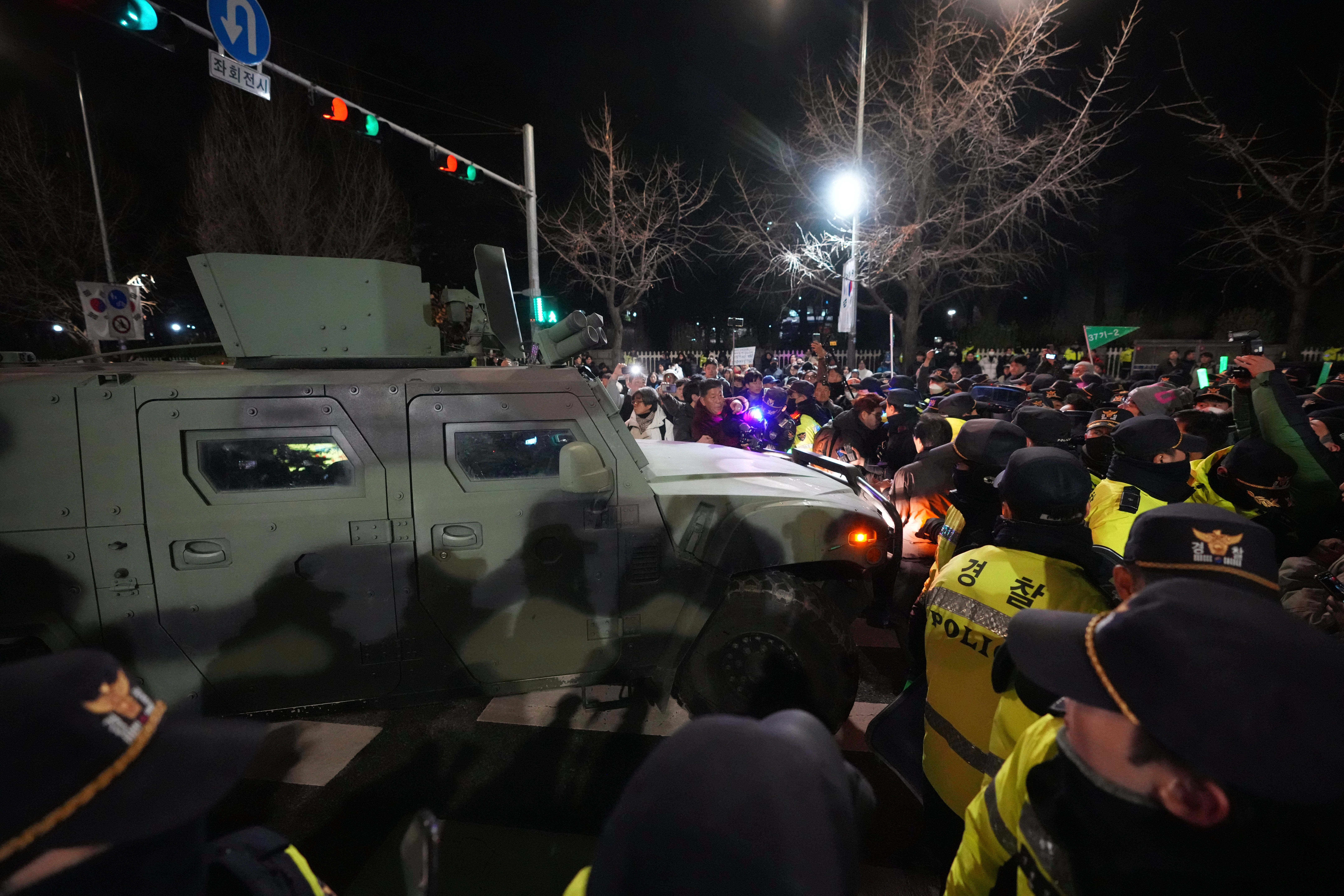South Korean president calls off martial law following tense showdown with opposition
Protesters celebrate outside parliament just hours after clashing with the military
South Korean president Yoon Suk Yeol has announced he will undo his dramatic declaration of martial law just hours after his military clashed with protesters outside parliament.
The short-lived decree, which opposition figures described as a coup, shocked South Korea as the president vowed to eliminate “anti-state” actors he accused of sympathising with communist North Korea.
After the edict late on Tuesday night, the military surrounded the National Assembly in Seoul and clashed with protesters outraged at the declaration.
Less than three hours later, parliament voted to lift the declaration, with National Assembly speaker Woo Won Shik declaring that the martial law was “invalid” and that parliamentarians “will protect democracy with the people”. Even Mr Yoon’s own party called for the declaration to be undone.
But the military refused to back down as officials said they would wait for the president to respond to the vote, in accordance with the constitution.
After around two hours of limbo, Mr Yoon then reappeared to announce that he would soon lift the martial law.
He said his government had withdrawn the military personnel that had been deployed, and that he would formally lift martial law following a cabinet meeting as “soon as members arrive”.
“I declared martial law at 11 o’clock last night with a firm will to save the country against anti-state forces that are trying to paralyse the essential functions of the state and destroy the constitutional order of liberal democracy,” he said.
“However, a little while ago, the National Assembly demanded the lifting of martial law, so the troops deployed for martial law affairs were withdrawn. Martial law will be lifted immediately.”
Mr Yoon then called a cabinet meeting in the early hours of Wednesday morning following mass protests and a parliamentary vote opposing the declaration. Martial law was formally undone as quickly as it had been decreed.
Angry opposition figures, however, vowed that the enormity of Mr Yoon’s actions must yield an equal response, the reversal of martial law notwithstanding.

Speaking with protesters outside parliament following the reversal, Cho Kuk, the head of a minor opposition party, said: “This isn’t over. [Mr Yoon] put all the people in shock. The president is a dangerous being … threatening democracy and constitution.”
He vowed to impeach Mr Yoon by putting together votes from other parties.
Although martial law ended as quickly as it began, the president’s surprising initial decree harkened back to an era of authoritarian leaders that the country has not seen since the 1980s.
It also shocked South Korea’s Western allies, while commentators feared that North Korea could take advantage of the turmoil.
Police and military personnel were seen leaving the assembly’s grounds after Mr Woo called for their withdrawal. Lee Jae-myung, leader of the liberal Democratic Party, which holds the majority in the 300-seat parliament, had said the party’s lawmakers will remain in the assembly’s main hall until Mr Yoon formally lifts his order.
“Democratic Party lawmakers, including me and many others, will protect our country’s democracy and future and public safety, lives and properties, with our own lives,” Mr Lee told reporters.
The crowds that had gathered outside the assembly and clashed with the military, calling for Mr Yoon to step down, suddenly erupted into praise as the president seemed to back down.
Under South Korea’s constitution, the president can declare martial law during “wartime, war-like situations or other comparable national emergency states” that require the use of military force to maintain peace and order. It was questionable whether South Korea is currently in such a state.
When martial law is declared, “special measures” can be employed to restrict the freedom of press, freedom of assembly and other rights, as well as the power of courts.
The constitution also states that the president must oblige when the National Assembly demands the lifting of martial law with a majority vote.
In Washington, the White House said the US was “seriously concerned” by the events in Seoul. A spokesperson for the National Security Council said president Joe Biden’s administration was not notified in advance of the martial law announcement and was in contact with the South Korean government.
Speaking at an event with Japan’s ambassador to Washington, US deputy secretary of state Kurt Campbell, a longtime Asia diplomat, said they expected the dispute to be resolved peacefully and in accordance with the rule of law.
Join our commenting forum
Join thought-provoking conversations, follow other Independent readers and see their replies
Comments
Bookmark popover
Removed from bookmarks